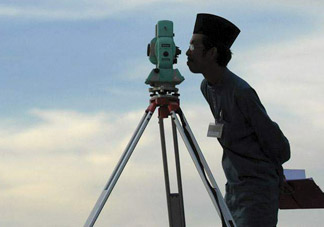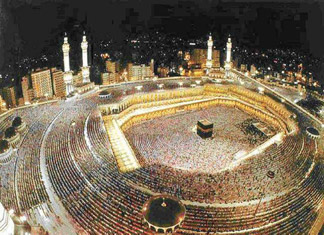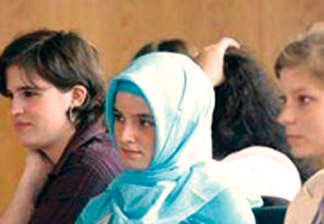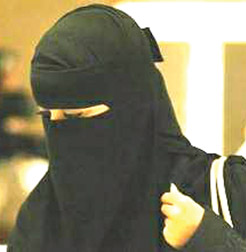|
ISLAM
Fasting-act of meritorious, spiritual and physical gain
Al Haj M.B.M. Mahir
Fasting
* It is a practice prescribed to Islam communities
* Brain should control devious thinking
* Eyes should reject its attention on the wrong sights
* The nose must refuse to inhale any smell forcibly
* Fasting is practised amongst different groups of Christians
The system of fasting has been adopted in all forms of religion as an
essential aspect not only as a biological factor but also as an exercise
beneficial both physically and otherwise. The institution of fasting is
prescribed as an act of meritorious, spiritual and physical gain in all
established religions. The Holy Quran refers to fasting as a practice
prescribed to all those who preceded Islam. There is no single community
in this world unto which fasting has not been ordained. The Islamic
interpretation of fasting is to abstain from the intake of food and
water from Dawn to Dusk. This is the literal aspect of fasting. But the
real spirit of Islamic fasting is to apply the abstinence of all
sensitive, emotional, aromatic and realistic senses that disturbs the
human anatomy.
|

A Brunei officer looking through the telescope for the new moon
to begin the month of Ramadan fast. |
In Islamic fasting the brain should control devious thinking and
exercise fasting in its thoughts. The eyes should observe fasting, by
rejecting its attention on the wrong sights; the ears should close their
source of hearing the detestable sounds performing the true fast; the
nose must refuse to inhale any smell forcibly and wantonly in order to
fast; while the mouth fasting without food, the tongue between the lips
must rigidly observe fasting avoiding unnecessary and sinful talk; the
heart which is the seat of the Lord with full love and mercy should
refrain from all evil thoughts; the hands observe fasting is not doing
endangering work; the fasting of the privy is to avoid nefarious acts:
and the legs should fast in abstaining to walk towards evil. In short
the whole human body should exercise optimum fasting to realize the full
effects of Fasting as a whole.
Socially, fasting enables the realizations of the pains of hunger by
those who have not experienced it. People who are affluent and
comfortable in life are provided an opportunity to understand the
emotions and feelings of the less affluent. This social realization
enables an economic development of the less fortunate as obligatory
Fasting is followed by the obligatory charity which is calculated and
distributed as a meritorious act during this Holy Month. It is narrated
in the tradition that a charitable act in the month of fasting is 70
times more than in the normal days and hence the well to do hasten to
perform this, while fasting in order to achieve the 70 fold merits which
in turn benefits the poor and the needy more than 70 times. This solves
not only the social aspect but also the economic and financial
advancement of the community.
The medical aspect of fasting is felt much today by the entirety of
the society as the benefit derived are multifarious. It is accepted and
agreed that fasting results in a healthy life which provides longevity,
freshness and purifies blood transfusion which in turn prevents the
occurrences of severe diseases.
It is a practice among the medical circle to use the facility of
fasting in different forms to obtain a report of the true condition of
the patient to facilitate a correct diagnosis in order to give remedial
treatment, thus fasting plays a pivotal role in the medical field.
Above all, the spiritual elevation of fasting and by fasting cannot
be fathomed by any instrument. For the application of prayer, the
supplication of surrendering, the abstinence of food and beverages, the
purification of sins, by charity and virtuous acts and the culmination
of all the good acts that please the Almighty will surely and truthfully
exalt the pious devotee into an Eternal Bliss and entitle him entry into
Heavenly Paradise. In short Fasting is indeed a soul searching exercise.
As revealed in the Holy Quran, fasting was prescribed to all
communities that preceded Islam. It is relevant here, to refer to the
practice and form of fasting in other faiths and communities of the
world.
In Christianity fasting is practised for purposes of Divine elevation
on different times and different ways. Intentional fasting is also
practised amongst different groups of Christians.
Jews who were the followers of Prophet Moses were more akin to the
system that prevailed then, among Arabs in the observance of fasting.
It is reported in the tradition of the Prophet of Islam that when the
Prophet (PBUH) went to Medina he found the Jews of Medina observing the
optional fast in the month of Muharram and the Prophet commented that he
will order his followers to observe more than one fast in the ensuing
year, as Prophet Moses was also more close to Islam and Muslims.
Christians and Jews being the people of the Book (Ahlal Kithab)
practised fasting with devoutness and dedication.
The very purpose of fasting as envisaged by the Holy Quran is to
transform the people into men of piety. If a community submits and
surrenders to the sublime mission and vision of Allah, it will reap the
Golden Harvest of virtue and the reward of the benevolent and
magnificent Allah.
How to welcome the month of Ramadan fast
Dr Muzammil H. Siddiqi
Allah is giving us another opportunity in our life to witness the
month of Ramadan.- a great time of Allah's blessings and His mercy.
Every Muslims should take full advantage of this time. We should get
ready now to welcome this month and receive it with happiness. Following
are some ways to welcome this month:
|

Ramadhan prayer in the Holy Mosque in Makka |
Pray to Allah
Pray to Allah that this month reaches you while you are in the best
of health and safety so that you can fast and do all your acts of
devotion with ease and enthusiasm. It is reported by Anas bin Malik that
the Prophet (PBUH) used to say from the beginning of Rajab in his
prayers:"O Allah bless us in Rajab, bless us in Sha'ban and bless us in
Ramadan." (Musnad Ahmad, 2228)
When he used to see Ramadan's crescent, he used to pray:"O Allah,
make this crescent to shine on us with safety, faith, security, Islam
and good fortune to do what is beloved and pleasing to our Lord Allah."
(Al-Darmi 1625)
Thanks and happiness
When the month comes, then you should be thankful to Allah and show
happiness. The Companions of the Prophet (PBUH) used to greet each other
on the beginning of Ramadan.
The Prophet (PBUH) said giving the good news of the month to his
companions, "The month of Ramadan has come to you. It is a blessed
month. Allah has made obligatory on you to fast during this month. The
gates of heaven are opened in this month and the gates of hell are
closed and the devils are chained. In this month there is a night that
is better than one thousand months. Whosoever is deprived of its
blessings is indeed deprived." (Musnad Ahmad 8631)
Planning and determination
You should make a good plan for the whole month about how you are
going to organize your days and evenings during Ramadan. Plan special
schedules for your work so that you can pray on time, read the Qur'an
and take Sahur (early morning meal) and Iftar (breaking fast) on time.
Have sincere intention and determination to take full advantage of this
time. Also have a full determination and commitment that you will not do
any sin or anything wrong during this time.Make sincere repentance and
seek the forgiveness of those whom you might have offended. In this way
you can benefit much more from your fasting and prayers.
Learn about the rules
Learn about the rules of fasting so that you do not do anything that
will spoil your fasts. Learn the way of Prophet Muhammad (PBUH) in
fasting. That is the best way. Fast is not spoiled only by eating and
drinking during the fast, but also by speaking bad words and doing wrong
things. The Prophet (PBUH) said, "Whosoever does not give up bad words
and bad deeds, Allah has no need in that he leaves his food and his
drink." (Al-Bukhari 1770)
Charity, generosity and kindness
The month of Ramadan is the month of kindness, charity and
generosity. Plan to invite your neighbours, co-workers, friends, Muslims
and non-Muslims to have Iftar-break fast- with you. Let your non-Muslims
friends and neighbours know about this month and its blessings. Be more
generous and help the poor and needy. Plan to give your obligatory and
optional charity at this time and help others as much as you can. It is
reported in a Hadith: The Prophet (PBUH)was the most generous person,
but in Ramadan he used to be more generous when Angel Jibrael who used
to see him during Ramadan every night and he used to read the Qur'an
with him. The Prophet (PBUH) was then more generous with goodness than
the blowing wind." (Al-Bukhari, 5)
Why I shed bikini for Niqab: Sara Bokker
"Niqab is the new symbol of woman's liberation. To women who
surrender to the ugly stereotype against the Islamic modesty of Hijab, I
say: You don't know what you are missing".
I am an American woman who was born in the midst of America's
"Heartland." I grew up, just like any other girl, being fixated with the
glamour of life in "the big city." Eventually, I moved to Florida and on
to South Beach of Miami, a hotspot for those seeking the "glamorous
life." Naturally, I did what most average Western girls do. I focused on
my appearance and appeal, basing my self-worth on how much attention I
got from others. I worked out religiously and became a personal trainer,
acquired an upscale waterfront residence, became a regular "exhibiting"
beach-goer and was able to attain a "living-in-style" kind of life.
|

Sara Bokker just after embracing Islam |
Years went by, only to realize that my scale of self-fulfillment and
happiness slid down the more I progressed in my "feminine appeal." I was
a slave to fashion. I was a hostage to my looks. As the gap continued to
progressively widen between my self-fulfillment and lifestyle, I sought
refuge in escapes from alcohol and parties to meditation, activism, and
alternative religions, only to have the little gap widen to what seemed
like a valley. I eventually realized it all was merely a pain killer
rather than an effective remedy.
By now it was September 11, 2001. As I witnessed the ensuing barrage
on Islam, Islamic values and culture, and the infamous declaration of
the "new crusade," I started to notice something called Islam. Up until
that point, all I had associated with Islam was women covered in
"tents," wife beaters, harems, and a world of terrorism.
As a feminist libertarian, and an activist who was pursuing a better
world for all, my path crossed with that of another activist who was
already at the lead of indiscriminately furthering causes of reform and
justice for all. I joined in the ongoing campaigns of my new mentor
which included, at the time, election reform and civil rights, among
others. Now my new activism was fundamentally different. Instead of
"selectively" advocating justice only to some, I learned that ideals
such as justice, freedom, and respect are meant to be and are
essentially universal, and that own good and common good are not in
conflict. For the first time, I knew what "all people are created equal"
really means. But most importantly, I learned that it only takes faith
to see the world as one and to see the unity in creation.
One day I came across a book that is negatively stereotyped in the
West-The Holy Qur'an. I was first attracted by the style and approach of
the Qur'an, and then intrigued by its outlook on existence, life,
creation, and the relationship between Creator and creation. I found the
Qur'an to be a very insightful address to heart and soul without the
need for an interpreter or pastor.
Eventually I hit a moment of truth: my new-found self-fulfilling
activism was nothing more than merely embracing a faith called Islam
where I could live in peace as a "functional" Muslim.
I bought a beautiful long gown and head cover resembling the Muslim
woman's dress code and I walked down the same streets and neighbourhoods
where only days earlier I had walked in my shorts, bikini, or "elegant"
western business attire. Although the people, the faces, and the shops
were all the same, one thing was remarkably distinct-I was not-nor was
the peace at being a woman I experienced for the very first time. I felt
as if the chains had been broken and I was finally free. I was delighted
with the new looks of wonder on people's faces in place of the looks of
a hunter watching his prey I had once sought. Suddenly a weight had been
lifted off my shoulders. I no longer spent all my time consumed with
shopping, makeup, getting my hair done, and working out. Finally, I was
free.
Of all places, I found my Islam at the heart of what some call "the
most scandalous place on earth," which makes it all the more dear and
special.
While content with Hijab I became curious about Niqab, seeing an
increasing number of Muslim women in it. I asked my Muslim husband, whom
I married after I reverted to Islam, whether I should wear Niqab or just
settle for the Hijab I was already wearing. At the time, my Hijab
consisted of head scarf that covered all my hair except for my face, and
a loose long black gown called "Abaya" that covered all my body from
neck to toe.
|

Sara Bokker today |
A year-and-a-half passed, and I told my husband I wanted to wear
Niqab. My reason, this time, was that I felt it would be more pleasing
to Allah, the Creator, increasing my feeling of peace at being more
modest. He supported my decision and took me to buy an "Isdaal," a loose
black gown that covers from head to toe, and Niqab, which covers all my
head and face except for my eyes.
Soon enough, news started breaking about politicians, Vatican
clergymen, libertarians, and so-called human rights and freedom
activists condemning Hijab at times, and Niqab at others as being
oppressive to women, an obstacle to social integration, and more
recently, as an Egyptian official called it-"a sign of backwardness. "
I find it to be a blatant hypocrisy when Western governments and
so-called human rights groups rush to defend women's rights when some
governments impose a certain dress code on women, yet such "freedom
fighters" look the other way when women are being deprived of their
rights, work, and education just because they choose to exercise their
right to wear Niqab or Hijab.
Today, women in Hijab or Niqab are being increasingly barred from
work and education not only under totalitarian regimes such as in
Tunisia, Morocco, and Egypt, but also in Western democracies such as
France, Holland, and Britain.
Today I am still a feminist, but a Muslim feminist, who calls on
Muslim women to assume their responsibilities in providing all the
support they can for their husbands to be good Muslims. To raise their
children as upright Muslims so they may be beacons of light for all
humanity once again. To enjoin good-any good-and to forbid evil-any
evil. To speak righteousness and to speak up against all ills. To fight
for our right to wear Niqab or Hijab and to please our Creator whichever
way we chose. But just as importantly to carry our experience with Niqab
or Hijab to fellow women who may never have had the chance to understand
what wearing Niqab or Hijab means to us and why do we, so dearly,
embrace it.
Most of the women I know wearing Niqab are Western reverts, some of
whom are not even married. Others wear Niqab without full support of
either family or surroundings. What we all have in common is that it is
the personal choice of each and every one of us, which none of us is
willing to surrender.
Willingly or unwillingly, women are bombarded with styles of
"dressing-in- little-to- nothing" virtually in every means of
communication everywhere in the world. As an ex non-Muslim, I insist on
women's right to equally know about Hijab, its virtues, and the peace
and happiness it brings to a woman's life as it did to mine. Yesterday,
the bikini was the symbol of my liberty, when in actuality it only
liberated me from my spirituality and true value as a respectable human
being.
Ceylon Baithulmal Fund
Over 50 years of service to the poor and needy:
Nazvi Rahmana
The Ceylon Baithulmal Fund established in 1957 has completed 54 years
of service to the poor, the destitute and the needy.It has been of
service to the young, old, displaced, refugees, orphans, widows,
students, undergraduates, villagers, city dwellers, shanty dwellers,
unemployed and the under employed among others.
The fund has helped and assisted in the construction of Masjids and
Madrasas (religious schools), toilets, wells, houses and water tanks. It
has helped the sick, the limbless, the roofless and the shelterless.
The CBF has provided marriage and Iddah (mourning period of four
months and 10 days after husband's death) allowances, loans to redeem
jewellery to avoid interest based pawning, to repair houses, to pay off
debts, to start a vocation or self employment.
The devastating floods in the early part of the year shattered the
lives of many families especially in the east and during such tragedies
the fund responds with emergency relief and more importantly by
addressing the long-term needs of the victims by providing the needed
resources which will assist them to generate a regular income and
support their families.
The fund has continuously been a benefactor of the twin Islamic
principles of Zakat-obligatory charity- and Sadaqah-optional charity.
Poverty alleviation has been its central activity and, the Fund has
always received overwhelming response from the community in its efforts
to relieve the sufferings of the needy and the poor.
It is to the credit of the founding fathers and those others who
managed the Fund over the 50 plus years, led by the likes of Speaker of
Parliament late. H.S. Ismail the Dr. M.C.M. Kaleel, I.A. Cader, A. Aziz,
A.H.L.A. Saleem, Lafir Cassim and Justice M. Jameel, along with others
constituting the Management Committees inclusive of the late S.S.
Issadeen who had worked for the CBF for over 40 years, most of it in the
capacity of its Secretary, that the CBF has been able to help, the
destitute and the needy to live a life of dignity without having to
stretch themselves for alms.
The Committee of Management, conscious of its responsibilities of
accountability towards Almighty Allah, ensures that all contributions
received are disbursed and distributed where they are needed most
bearing in mind the intended purpose of the donors. The financial
transparency and strict standards of efficiency exercised by the
Committee has earned the trust and support of an increasing number of
individual and institutional donors every year. The increase in
contributions received by the Fund annually reflects this confidence. |



